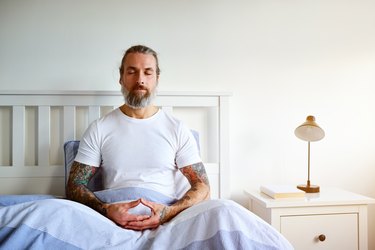
With all the loss, fear and turmoil of the last few months, you might feel, at times, like you're in a waking nightmare. It's no surprise, then, that your actual dreams have been preoccupied by the pandemic.
If you've had disturbing dreams lately, you're not alone. Below, sleep specialist Michael Breus, PhD, explains three ways the pandemic has disrupted your slumber and shares ways to nix the nasty nightmares.
Video of the Day
Video of the Day
Get tips on how to stay healthy, safe and sane during the novel coronavirus pandemic.
1. Your Dreams Are More Stressful
"People are having more nightmares and negatively-focused dreams during the pandemic," Breus says.
Case in point: A 2020 Dreaming study found that participants' recent dreams elicited strong negative emotions and involved more dangerous, violent and frustrating situations.
COVID nightmares may be especially common for people suffering significant strain during the pandemic.
"Research into trauma and its relationship to dreaming and sleep has shown that the more closely and directly people are affected by traumatic events, the more likely it is for their sleep to be disrupted and for nightmares to be intense," Breus adds.
This echoes the results of another 2020 study in Dreaming, which concluded that people who were most strongly impacted by the COVID-19 pandemic experienced the most disruptive effects on their dream life.
"The people in the 'epicenter' of the coronavirus pandemic include health care workers and other first responders, people who are sick or who are close to someone who is sick," says Breus, adding, "There are also millions of people who have been laid off from jobs, and people who are facing economic crises that place them in an economic 'epicenter.'"
"If you're on a heavy diet of pandemic-related news, you can expect to see that information make its way into your dreams."
Even if you're not at the epicenter of the COVID crisis, it's still likely you've experienced sleeplessness, anxiety and nightmares at one point or another.
"We're living through unprecedented, frightening times, with a future outlook that is deeply uncertain. That's a universal — and potentially traumatic — reality right now," Breus says.
And while nightmares are unpleasant, they might serve a valuable function — helping us process all the difficult emotions and stressful experiences of our waking lives.
"As unwelcome as nightmares and disturbing dreams feel, they may be a sign of the brain doing some essential, important work to ease the intensity and emotional charge of our currently heavy daily load of stress and worry," Breus explains.
Plus, your dreams may be helping you prep for stressful real-life scenarios. According to the threat-simulation dream theory, "dreams are a rehearsal space for the mind to 'game out' threats and obstacles it anticipates facing in waking life, and practice how to best respond to these challenges," Breus says.
"When we're constantly anxious and worried, our bodies take up residence in 'fight or flight' mode, and dreams may take up the work of helping us rehearse our way out of our problems," he says.
Related Reading
2. Your Dreams Feel More Real
Do your dreams feel really real lately? Breus says many people are having more striking, vivid and realistic dreams during the pandemic.
That's in part because we draw heavily on daily life for dream material thanks to a phenomenon called dream incorporation, he explains. "If you're on a heavy diet of pandemic-related news, you can expect to see that information your brain is taking in make its way into your dreams."
Essentially, your very real concerns are seeping into your slumber and playing out during your sleep.
Indeed, another 2020 study in Dreaming, which analyzed the dream imagery of Canadian university students during the beginning of the pandemic, found that images associated with waking anxiety were present in dreams. Researchers discovered that images related to the virus and heads (the body part linked to catching and spreading COVID-19) were more frequent compared to a control group (students' dream journals pre-pandemic). In other words, symbols representing people's greatest worries pervaded their pillow time.
And don't be surprised if your childhood friend pops up in the middle of a pandemic dream, Breus says. "Right now, much of our activity, movement and social interaction is curtailed" and "under such restrictive, repetitive daily living conditions, our brains are likely drawing more heavily on older memories for dream material."
3. You Remember Your Dreams More Often
Under normal circumstances, you might find it difficult to remember your dreams, which can become hazy upon waking. But that's changing during the pandemic.
"People are remembering more of their dreams, experiencing what's known in sleep science as higher dream recall," Breus says. (The earlier study in Dreaming confirms this.)
That may be in part due to the emotionally charged quality of nightmares, which can be strange or vivid. "Nightmares themselves, because they are frightening and upsetting, make us more likely to wake up from a dreaming state, with fresh memories of our nightmares intact," Breus says.
What's more, "nightmares have a tendency to keep us awake, and the data shows that if you are awake for more than about five minutes, you will begin to encode your dreams into your memory," he explains.
How to Stop Your Nightmares

Below, Breus shares strategies to get a sounder night's slumber and dream more peacefully during the pandemic.
1. Focus on Optimistic Thoughts Before Bed
"Research has shown that our levels of optimism and peace of mind, or pessimism and anxiety, have a direct effect on the subject matter and emotional content of our dreams," Breus says.
"If your dreams are currently disruptive and disturbing right now, create a nightly 'Power Down Hour' that focuses on bringing you to a positive frame of mind before bed," he recommends.
Need some inspo? Here are a few ideas from Breus:
- Watch a funny or inspiring TV show
- Talk to a friend or loved one who lifts you up
- Pray or engage in a spiritual practice that elevates you
- Look at old photo albums and enjoy some positive memories
Yoga or meditation can also put you in a zen state of mind before drifting off to dreamland.
Related Reading
2. 'Re-write' Your Nightmares
A technique called "image rehearsal therapy" — where people re-write the stories of their nightmares, turning their scary scripts into happier, more peaceful ones — has been shown to help reduce nightmares, especially reoccurring ones, and make sleep easier and less stressful, Breus says.
Once you re-script your dream, visualize it, replaying it in your mind before bed. Over time (five to seven days, Breus says), the content of your bad dream may begin to change.
3. Limit Your Media Consumption
Watching the news and scrolling through social media can increase your anxiety and stress, leading to more negatively-charged dreaming. Breus recommends limiting your overall daily media intake, especially at night before bed. And if you're tempted to scroll, leave your phone in another room.
Related Reading
4. Don’t Oversleep
"If you sleep in, you will ultimately get more REM sleep (which happens more in the back one-third of the night), which leads to more dreams and nightmares," Breus explains.
Plus, oversleeping also throws off your circadian rhythms.
5. Drink Less Alcohol
"Whatever emotion you are having in a dream is often increased by the presence of alcohol," Breus says.
What's more, drinking booze affects our sleep quality, which can also boost bizarre dream content, he adds.
6. Cut Down Your Caffeine
Caffeine is a stimulant, which can increase anxiety in some people, says Breus, adding, "Do any of us really need to add to our anxiety right now?."
That said, Breus suggests limiting caffeinated drinks, especially three to four hours before bed, and ideally by 2 p.m.
7. Move More
Due to lockdown and stay-at-home restrictions — and with many gyms still closed — our activity levels have dropped dramatically. "Lack of exercise, including daily movement, is affecting sleep quality," Breus says.
The more you move, the better you will sleep. Breus suggests sticking to a daily exercise routine and finding small ways to incorporate more movement throughout your day — take out the trash, walk to the mailbox, walk your dog, etc.
8. Reach Out for Help
"If you're experiencing debilitating dreams or waking anxiety that's affecting your ability to function normally, don't try to tough it out or go it alone," Breus says. Seek out a licensed mental health professional who can help you navigate and cope during this difficult time.
Concerned About COVID-19?
Read more stories to help you navigate the novel coronavirus pandemic:
Is this an emergency? If you are experiencing serious medical symptoms, please see the National Library of Medicine’s list of signs you need emergency medical attention or call 911.